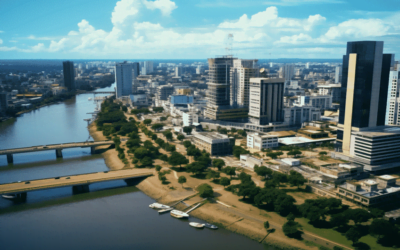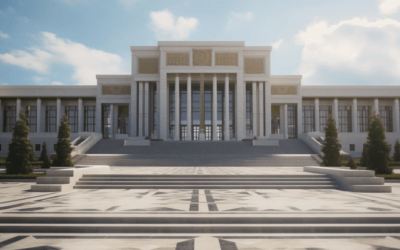Hey there, fellow drone enthusiasts and curious minds! If you’ve ever found yourself pondering the ins and outs of flying a drone in Niger, you’re in the right place.
I know the frustration of searching for clear and reliable information on drone laws, which is why I’ve delved deep into the world of Niger Drone Laws to provide you with answers you can trust.
So, whether you’re a drone hobbyist, a commercial operator, or a visitor eager to explore Niger’s skies, I’ve got your back. Let’s navigate the complex skies of drone regulations in Niger together.
You might be wondering, “Where do I even begin with Niger’s drone laws?” Well, you’re not alone. I’ve been there, scouring the internet for information, feeling overwhelmed by the lack of clear guidelines.
But fear not! I’ve rolled up my sleeves and conducted thorough research to demystify the regulations governing drone flights in Niger.
From the intricacies of flying over people to the rules for foreign visitors and even the rules for government drone operators, I’ve gathered insights that will put your mind at ease.
So, if you’re looking for a straightforward guide that’s both informative and easy to digest, you’re in the right place.
I’ve taken the time to break down Niger’s drone laws into a comprehensive article that’ll answer all your questions.
Whether you’re interested in the rules for hobbyists and commercial operators or simply want to understand the dos and don’ts, this article is your one-stop resource. Keep reading to uncover the key to safe, legal, and enjoyable drone flights in Niger.
- Overview of Drone Laws in Niger
- Categories of Drone Operators in Niger
- Hobbyist Drone Laws in Niger
- Commercial Drone Laws in Niger
- Niger Drone Laws for Foreign Visitors and Tourists
- Niger Drone Rules for Government Operators
- Additional General Drone Laws in Niger
- Traveling with Drones in Niger
- Final Thoughts on Niger Drone Laws
- Frequently Asked Questions
Overview of Drone Laws in Niger

Hey there, let’s dive into the exciting world of drone regulations in Niger. It’s crucial to understand that Niger takes its drone laws seriously, and for good reason.
These flying machines, no matter how small, can have significant implications on safety, privacy, and the overall well-being of the country. So, let’s break it down.
The Niger Drone Landscape
Niger, like many countries, has specific regulations governing drone operations. These laws are in place to maintain safety and ensure that drone flights don’t pose risks to people, property, or other aircraft.
You might wonder, “Why do I need to know these laws?” Well, whether you’re a hobbyist capturing stunning aerial shots or a commercial operator using drones for various purposes, it’s essential to adhere to these rules.
For hobbyists and professionals alike, these regulations set the boundaries and guidelines for flying your drone in Niger’s skies.
But hey, don’t worry; understanding these rules isn’t rocket science. It’s about ensuring that your drone flights are safe, respectful, and compliant with local laws. So, let’s navigate this regulatory landscape together.
The Watchful Guardian
In the world of drones, every country needs a guardian to ensure that the skies remain safe. In Niger, that guardian is the Agence Nationale de l’Aviation Civile (ANAC).
ANAC takes the responsibility of regulating drone operations very seriously. This government agency is the go-to authority for all things related to drones.
ANAC’s role isn’t just about setting rules; it’s also about educating drone enthusiasts, providing guidance, and overseeing the implementation of these regulations.
They’re the ones ensuring that drone pilots, whether hobbyists, commercial operators, or visitors, follow the rules diligently. So, if you’re ever in doubt about drone regulations in Niger, remember that ANAC is your ultimate source of clarity and guidance.
Also Read: Drone Regulation in Nicaragua 2024
Categories of Drone Operators in Niger

Let’s break it down, my friends—drone enthusiasts come in all shapes and sizes, and so do the rules that govern them in Niger.
Here, we’ve got a spectrum of drone operators, each with a unique set of guidelines. So, what are these categories? Let’s explore.
Diverse Categories, One Sky
In the world of drone operations, diversity is the name of the game. In Niger, we’ve got four primary categories of drone operators: hobbyists, commercial operators, foreign visitors and tourists, and the government.
Hobbyists are the folks who fly drones for fun.
They’re the creative souls, capturing stunning aerial views and breathtaking landscapes just because they love it.
Then there are the commercial operators, the pros who use drones for various business purposes, from aerial photography to surveying land or even delivery services.
Foreign visitors and tourists, you’re not left out. You can explore Niger’s skies with your drones as well, provided you understand the rules.
And, of course, we can’t forget the government operators who use drones for various official purposes.
Each category has its own regulations, but understanding these distinctions is the key to navigating the skies of Niger responsibly. So, let’s embark on this journey to unravel the drone laws for each group.
Also Read: Drone Regulation in New Zealand 2024
Hobbyist Drone Laws in Niger

Now, let’s talk about those drone enthusiasts who fly their machines purely for the joy of it—hobbyist drone operators in Niger. The skies are your canvas, but like any artist, you’ve got to follow the rules.
Rules of the Game
As a hobbyist drone operator in Niger, there are some rules you should be aware of. These rules are in place to ensure that your drone flights are both enjoyable and safe.
While they might seem like a bit of a buzzkill, they’re essential for a harmonious coexistence between your drone and the world below.
No License is Needed, But Registration is a Must
The good news for hobbyists is that you don’t need a specific pilot license to soar in the skies in Niger.
However, there’s a small but crucial detail to remember—you’ve got to register your drone. It’s like giving your drone an ID card.
This registration ensures that your drone is officially recognized, and it’s a simple step to comply with the law.
Altitude, Distance, and More
When you’re up there in the skies, there are a few limits you should be aware of. Firstly, your drone should stay below 90 meters in altitude.
So, no high-altitude adventures! Keep a respectable distance too, at least 30 meters from vehicles, boats, and the public if your drone weighs more than 250 grams but doesn’t exceed 1 kilogram.
As the weight of your drone increases, so does the separation. For drones between 1 kilogram and 25 kilograms, maintain a minimum distance of 76 meters.
Plus, it’s a good practice to steer clear of aerodromes (those are places where planes take off and land) by at least 5.6 kilometers. And don’t even think about buzzing around helipads used only by helicopters within 1.9 kilometers. Safety first!
Play by the Rules
As drone enthusiasts, we’re bound to share the skies with others, whether they’re fellow drone pilots or manned aircraft.
Following these rules isn’t just about being compliant; it’s about ensuring the safety of everyone involved.
So, remember, play by the rules, and you’ll have a fantastic time soaring through Niger’s beautiful landscapes, capturing memories that last a lifetime.
Also Read: Drone Regulation in Netherlands 2024
Commercial Drone Laws in Niger

Alright, now it’s time to talk business, quite literally. If you’re a commercial drone operator in Niger, there are some rules and regulations you need to be well-versed in. These rules ensure that your drone-related business soars without causing turbulence.
Business in the Skies
Niger takes the operation of commercial drones seriously, and businesses must adhere to specific regulations.
These rules are in place to ensure that your operations are safe, professional, and beneficial for everyone involved.
Permission to Take Flight
For commercial drone operators, one key requirement is authorization from the Agence Nationale de l’Aviation Civile (ANAC).
This is the organization you’ll want to have on your side. ANAC ensures that your commercial drone operations comply with all applicable rules and regulations. They’re the gatekeepers who grant you the green light for your aerial endeavors.
Sky-High Details
When flying commercially in Niger, you should keep a few crucial details in mind. The altitude limit remains the same as for hobbyists: a maximum of 90 meters. However, the distance from vehicles, boats, and the public varies with your drone’s weight.
For drones weighing more than 250 grams but less than 1 kilogram, maintain at least 30 meters of separation.
As your drone’s weight increases, so does the distance required. Drones between 1 kilogram and 25 kilograms should stay a minimum of 76 meters away from the same.
Additional rules apply, including keeping a considerable distance from aerodromes and helipads, adhering to day flights only, maintaining continuous command and control, and ensuring you don’t pose a danger to life or property.
It’s a bit of a checklist, but hey, it’s about ensuring the safety and well-being of all.
Responsibility Matters
Operating commercially means that you’re a professional in the sky. The responsibility is on your shoulders to ensure that your drone operations are conducted safely, ethically, and by the law.
By following these rules diligently, you’re not just adhering to regulations; you’re establishing a solid reputation and contributing to the positive growth of the drone industry in Niger. Remember, responsible and lawful commercial drone operations are a win-win for all.
Also Read: Drone Regulation in Nepal 2024
Niger Drone Laws for Foreign Visitors and Tourists

Now, let’s talk about exploring the beautiful Niger skies as a foreign visitor or tourist. Yes, you too can have a drone adventure here, but there are some essential rules and guidelines to keep in mind.
Warm Welcome to Drone Enthusiasts
Niger extends a warm welcome to foreign visitors and tourists who wish to experience the thrill of drone flying. However, remember, with this exciting privilege comes a responsibility to adhere to local regulations. It’s all about ensuring a safe and enjoyable drone experience for you and everyone else.
Flying as a Visitor
The good news is that you don’t need to acquire a specific pilot license to fly your drone as a foreign visitor or tourist in Niger. However, don’t forget this key detail—registering your drone and obtaining proper authorization is essential.
It’s a straightforward process that ensures your drone is recognized and monitored during your stay.
Navigating the Skies
While flying your drone in Niger, it’s crucial to follow some safety and operational guidelines. Keep your drone below 90 meters in altitude and maintain a safe distance from vehicles, boats, and the public, as stipulated by your drone’s weight.
Always operate during daylight hours, keep visual contact with your drone, and make sure you’re aware of your surroundings. By following these guidelines, you’re not just adhering to the law but also ensuring a secure and pleasant flying experience.
Responsible Visitor
When you’re in Niger, respect for local regulations and privacy is paramount. Fly your drone without intruding on others’ personal space or violating their privacy.
Remember, you’re a guest in this stunning country, and it’s all about creating positive experiences for everyone. By being a responsible visitor, you can enjoy the beauty of Niger while adhering to the rules and ensuring a harmonious atmosphere for all.
Also Read: Drone Regulation in Nauru 2024
Niger Drone Rules for Government Operators

Government drone operators in Niger have a unique role to play in ensuring the country’s safety and development. Here are the regulations and guidelines that govern their drone operations.
Regulations for Government Operators
Government operators in Niger work under specific regulations to maintain the safety and security of the nation. These regulations are in place to ensure that government drones are used for legitimate and authorized purposes, serving the public good.
The Need for a Pilot License
One key distinction for government drone operators is the requirement for a pilot license. This license ensures that operators are trained, skilled, and capable of handling drone operations effectively and safely. It’s a testament to the government’s commitment to responsible drone use.
Registration and Restrictions
Just like any other category of drone operators, government operators are also required to register their drones. This process allows for the monitoring and identification of government-owned drones.
While the specific restrictions may vary based on the purpose of the drone operations, there are common regulations that must be followed, including altitude limits, distance requirements, and operational restrictions.
By adhering to these regulations and guidelines, government operators play a crucial role in leveraging drone technology for the benefit of the country, whether it’s for surveillance, disaster response, or other essential purposes.
Also Read: Drone Regulation in Namibia 2024
Additional General Drone Laws in Niger

Beyond the specific categories and regulations, some general drone laws in Niger apply to all drone operators. These laws form the bedrock of safe and responsible drone use in the country.
Universal Drone Laws
No matter your purpose or category of operation, certain drone laws in Niger apply across the board. These laws are designed to ensure the safety and privacy of individuals, property, and public spaces.
Safety and Privacy Matters
Among these general laws, you’ll find key rules such as not flying your drone over people or large crowds.
This regulation helps prevent potential accidents and ensures that your drone doesn’t pose a risk to those on the ground.
Additionally, respecting the privacy of others is essential. Avoid capturing footage or images in a way that infringes on someone’s private space. It’s all about using drone technology responsibly.
Moreover, you should steer clear of airports and sensitive areas. These are designated no-fly zones for drones to prevent any interference with manned aircraft or jeopardizing national security. These laws are in place for good reasons, and it’s vital to abide by them.
Safety and Compliance
These general drone laws are more than just legal obligations; they are the pillars of safe and compliant drone operations.
By following these laws diligently, you not only ensure that you’re on the right side of the law but also contribute to the safe and responsible growth of the drone industry in Niger.
It’s about fostering an environment where drones can benefit society without causing harm or disruption.
Also Read: Drone Regulation in Myanmar 2024
Traveling with Drones in Niger

Traveling with your beloved drone can be an exciting part of your adventures, but it comes with some crucial considerations, especially when you’re crossing international borders.
Navigating International Skies
Before embarking on your international drone adventure, it’s essential to be well-informed about the regulations and requirements of the country you’re visiting.
Different nations have varying rules and guidelines, so a bit of research can save you from surprises upon arrival.
The Carry-On Rule
One universal piece of advice for all drone travelers is to carry your drone in your carry-on luggage.
This recommendation stems from the Montreal Convention, which stipulates that airlines are only liable for losses of up to a certain amount for items in checked baggage.
Given the value and importance of your drone, it’s a smart move to keep it with you in the cabin.
Navigating the Lithium-Ion Maze
When it comes to drone batteries, things get a bit more complex. Lithium-ion batteries, which power most drones, are considered “dangerous goods” by airlines.
This is due to unfortunate incidents of these batteries catching fire. As a result, strict regulations surround the transport of such batteries on planes.
To comply with these rules, it’s advisable to invest in specialized bags designed for the safe transport of lithium-ion batteries.
Bags are an added layer of protection that ensures your batteries don’t inadvertently cause any trouble during your journey. Safe travels!
Also Read: Drone Regulation in Mozambique 2024
Final Thoughts on Niger Drone Laws

As we wrap up our journey through Niger’s drone laws, it’s essential to take a moment to recap what we’ve learned and reflect on the significance of these regulations.
We’ve delved into the specifics of Niger’s drone laws, covering different categories of operators, general regulations, and even the nuances of traveling with your drone.
These laws are in place to ensure the safety and privacy of the nation’s citizens and visitors, as well as the responsible use of drone technology.
Responsible and safe drone operation is not just a legal requirement; it’s a moral obligation. Whether you’re a hobbyist, a commercial operator, a foreign visitor, or a government agency, understanding and complying with local regulations is paramount.
It’s about striking a balance between enjoying the incredible opportunities that drones offer and respecting the rights and safety of others.
So, before you take flight in Niger, make sure you’re well-versed in the rules, guidelines, and best practices. By doing so, you contribute to a thriving drone community that benefits everyone.
Frequently Asked Questions
1. Can I fly a drone as a tourist in Niger?
Absolutely! Niger welcomes drone enthusiasts from around the world. Foreign visitors and tourists can fly drones in Niger. You don’t need a specific pilot license, but drone registration and authorization are required. Always remember to respect local regulations, ensure safety, and be mindful of privacy.
2. Are there specific rules for hobbyist drone operators in Niger?
Yes, there are rules for hobbyist drone operators in Niger. Hobbyists do not require a specific pilot license, but they must register their drones. There are altitude limits, distance requirements from people and vehicles, and other important restrictions. These rules are in place to ensure safe and responsible drone use in the country.
3. Can I fly a drone commercially in Niger?
Certainly, commercial drone flights are allowed in Niger. However, commercial operators need authorization from the Agence Nationale de l’Aviation Civile (ANAC). Specific altitude limits, distance requirements, and operational restrictions apply. Commercial drone operators must conduct their activities responsibly and lawfully.
4. What are the general drone laws in Niger?
Niger has general drone laws that apply to all drone operators. These laws include not flying over people or large crowds, respecting privacy, avoiding airports and sensitive areas, and other key safety measures. These laws are designed to ensure safety, security, and privacy for everyone.
5. Can I fly a drone over military installations in Niger?
In general, drones should not fly over military installations in Niger without the consent of competent authorities. These areas are usually designated as no-fly zones for security reasons. It’s essential to respect these restrictions to avoid legal issues and ensure national security.













